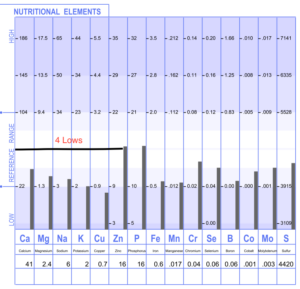Minerals are fundamental building blocks in the body, acting as cofactors in countless biochemical reactions that keep us healthy. When it comes to gut and hormone health, specific minerals play essential roles in supporting processes like digestion, fertility, energy production, and menstrual cycle regulation. Let’s dive into the key minerals that can make a difference and explore how they contribute to better health.
1. Magnesium: The Relaxer
Role in Health: Magnesium is often called the “relaxer” because of its critical role in calming the nervous system and relaxing muscles, including those in the digestive tract. This makes it crucial for digestive regularity and preventing issues like constipation. It also supports energy production, helping to alleviate fatigue, and plays a role in thyroid function by supporting the conversion of inactive T4 thyroid hormone to active T3.
Gut Health: Magnesium plays a key role in gut motility by relaxing the muscles of the intestines, facilitating smoother movement of food and waste through the digestive system. Magnesium can also help alleviate symptoms of “IBS” (Irritable Bowel Syndrome) by reducing spasms in the gut. However, it’s important to pair magnesium with other minerals like potassium and sodium, as imbalances can impede its effectiveness and contribute to bloating or constipation.
Period Health and Fertility: Magnesium helps balance estrogen and progesterone levels, making it valuable for menstrual cycle regulation and reducing PMS symptoms like cramps and mood swings. Its calming effect can also help manage stress levels, which is key for supporting fertility since chronic stress can disrupt ovulation and hormone balance.
2. Potassium: The Fluid Regulator
Role in Health: Potassium is vital for maintaining proper fluid balance within cells, which is essential for gut motility and preventing constipation. It works synergistically with sodium to ensure that fluids move efficiently throughout the digestive system, supporting hydration at the cellular level. Potassium is also critical for energy production and maintaining stable blood pressure, which can have far-reaching effects on overall vitality.
Gut Health: Potassium’s role in regulating muscle contractions extends to the digestive tract, making it essential for smooth and consistent peristalsis—the rhythmic contractions that move food through the gut. Low potassium levels can slow down digestion, leading to bloating, sluggish digestion, and constipation. By ensuring that potassium levels are adequate, you can support healthy gut motility and reduce discomfort associated with slow digestion.
Period Health and Fertility: Potassium plays a role in supporting the adrenal glands, which produce hormones like cortisol. Balanced cortisol levels are crucial for a healthy menstrual cycle and can impact fertility. Additionally, potassium helps alleviate water retention and bloating, common symptoms of PMS.
3. Copper: The Catalyst for Energy and Hormone Balance
Role in Health: Copper is an essential mineral that serves as a cofactor for enzymes involved in energy production and antioxidant defense. It supports iron absorption in the gut, making it crucial for maintaining healthy iron levels. Copper is also involved in the production of connective tissue and collagen, which supports gut lining integrity and gut health.
Gut Health: Copper aids in maintaining a healthy gut lining by supporting collagen synthesis, which is crucial for the mucosal barrier that protects the digestive system. Additionally, copper’s role in immune function means it helps maintain a balanced gut microbiome, reducing the risk of overgrowth of harmful bacteria and promoting a healthier digestive environment. It also aids in digesting fats and can be particularly beneficial for those with sluggish bile flow or gallbladder issues.
Period Health and Fertility: Copper helps support the formation of estrogen and can be beneficial in balancing hormones during the menstrual cycle. It plays a role in maintaining a healthy luteal phase (the second half of the menstrual cycle), which is important for fertility and sustaining a pregnancy. Adequate copper is needed for embryo implantation which is important for individuals looking to get pregnant.
4. Cobalt: Vital for Vitamin B12
Role in Health: Cobalt is a key component of vitamin B12, an essential vitamin for red blood cell formation and nerve health. B12 supports digestion by maintaining healthy levels of stomach acid, which is necessary for breaking down food and absorbing nutrients effectively. It also plays a role in energy production, making it a critical mineral for overall vitality.
Gut Health: Cobalt’s role in B12 synthesis is critical for maintaining stomach acid levels, which are essential for breaking down proteins and ensuring proper nutrient absorption. Sufficient B12 levels also support the health of the gut lining and help prevent conditions like leaky gut syndrome, where undigested particles can enter the bloodstream and trigger immune reactions. B12 is also necessary for peristalsis, making it important for regular bowel movements and overall digestive comfort.
Period Health and Fertility: Cobalt, through its role in vitamin B12, supports egg quality and ovulation, making it an important mineral for fertility. Proper B12 levels can also help prevent fatigue and mood fluctuations that are often seen in conditions like PMS.
5. Zinc: The Immune and Gut Health Hero
Role in Health: Zinc is known for its immune-supporting properties, but it also plays a significant role in gut health by supporting the integrity of the gut lining and reducing inflammation. Zinc is necessary for digestive enzyme function, helping to break down proteins and absorb nutrients more efficiently. It also aids in thyroid function by supporting the production of thyroid hormones.
Gut Health: Zinc is essential for healing the gut lining and is often used to help manage leaky gut syndrome and gastric ulcers. It supports the production of digestive enzymes like hydrochloric acid (HCl), which helps break down food in the stomach and prevents issues like indigestion. Zinc also helps maintain a balanced gut microbiome, reducing the likelihood of dysbiosis or overgrowth of harmful bacteria.
Period Health and Fertility: Zinc is vital for ovulation and the regulation of progesterone levels, which are crucial for a balanced menstrual cycle. It supports the production of testosterone in both men and women, making it a key player in fertility. Additionally, zinc’s anti-inflammatory properties can help alleviate cramping and mood swings during menstruation.
6. Iron: Essential for Blood and Energy
Role in Health: Iron is critical for oxygen transport throughout the body and supports energy production by helping red blood cells carry oxygen to tissues. It’s essential for maintaining energy levels, preventing fatigue, and supporting a healthy thyroid by aiding the production of thyroid hormones.
Gut Health: Iron’s role in hemoglobin production means it’s essential for delivering oxygen to all tissues, including the gut lining, which requires oxygen to maintain a healthy barrier. Adequate iron levels support intestinal healing and repair, especially after damage from conditions like leaky gut or inflammation. Additionally, balanced iron levels support a healthy gut microbiome, as iron is required for the growth of beneficial bacteria but can fuel pathogenic bacteria if imbalanced.
Period Health and Fertility: Iron is especially important for menstrual health because blood loss during menstruation can lead to low iron levels or anemia if not properly managed. Adequate iron levels support ovulation and overall fertility, ensuring that the body has enough energy to sustain a healthy reproductive system.
7. Other Relevant Cofactors: Manganese, Selenium, and Calcium
- Manganese: Supports digestive enzyme function and helps regulate blood sugar levels, which can impact mood and energy. It is also involved in collagen formation, aiding in gut lining repair.
- Selenium: Critical for thyroid function, as it supports the conversion of T4 to T3. Selenium also acts as an antioxidant, helping to protect the gut from oxidative damage and inflammation, and is key in reducing intestinal inflammation.
- Calcium: While often associated with bone health, calcium is also necessary for muscle contractions in the digestive tract, playing a role in gut motility. It is important for hormone signaling, impacting menstrual regularity and fertility.
How We Use HTMA to Address Mineral Imbalances in Gut and Hormone Health
In our practice, we use Hair Tissue Mineral Analysis (HTMA) as a powerful tool to uncover mineral imbalances that often lie at the root of persistent gut and hormone issues. Minerals are the building blocks for many crucial functions in the body—supporting enzymes, stomach acid production, and energy metabolism. Without a solid foundation of balanced minerals, even the best-designed protocols for gut healing, hormone support, or other health concerns can fall short.
Minerals like magnesium, potassium, sodium, copper, and zinc are directly involved in the production of digestive enzymes and stomach acid—both of which are vital for breaking down food and absorbing nutrients. When mineral levels are out of balance, digestion can slow down, gut motility can decrease, and the body’s ability to repair and maintain a healthy gut lining can be compromised.
For clients who have tried multiple gut protocols, restrictive diets, or supplements without seeing results, supporting their mineral balance through HTMA can be the missing piece of the puzzle. By prioritizing minerals, we can restore the body’s energy production, allowing it to better utilize nutrients and respond more effectively to other interventions.

Take, for example, a recent client who came to us after facing dead ends with several gut health protocols. Despite her efforts, she was still struggling with digestive issues, low energy, and irregular cycles. Through HTMA, we identified that she was in a “4 lows” pattern—a state of severe depletion across key minerals like calcium, magnesium, sodium, and potassium. This pattern is often seen in individuals whose bodies are in a state of chronic stress or depletion, making it difficult for them to respond to traditional gut or hormone protocols.
By focusing first on rebuilding her mineral levels and supporting her body’s foundational needs, she was able to finally see progress in areas that had previously been stagnant. This experience highlights why HTMA is such a valuable tool for us in helping clients achieve long-lasting improvements in their gut health and hormone balance.
Conclusion: Minerals as the Foundation of Health
Minerals play an intricate and interconnected role in maintaining our gut health and hormone balance. Addressing these key minerals—magnesium, potassium, copper, cobalt, zinc, iron, and their cofactors—can help support everything from energy levels and thyroid health to fertility and digestive function. Understanding how to optimize these minerals can be the key to unlocking better health and achieving lasting wellness.
If you’re looking to dive deeper into understanding how minerals impact your health, download my free mineral guide for practical tips and tools to start supporting your mineral balance today!









